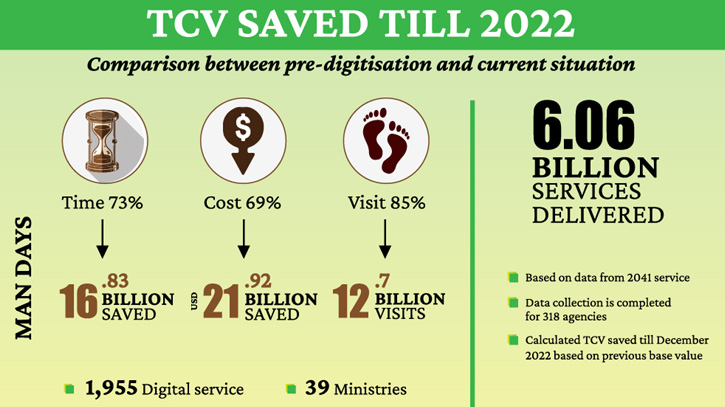12 March, 2023
What is Smart Bangladesh really?
What was a dream on March 7, 1971—Independent Bangladesh—became a reality on December 16, 1971....

The government’s digitalisation efforts have resulted in 16.83 billion days, $21.92 billion in costs, and 12.7 billion in visits savings for service recipients in the year 2022 along with ensuring transparency and accountability in public service delivery, a study has revealed.
The study “Assessing the Impact of Government Digitization Efforts on Time, Cost & Visits (TCV): An Analysis of 1,955 Digital Services” by Rifat-E-Jahan Siddiquee, Programme Associate – Data, a2i, told The Daily Messenger (TDM) that Time, Cost and Visit (TCV) measurement, a unique evaluation tool to assess the service delivery process by measuring impacts from the citizen’s point of view, was used to assess 1,955 digital services.
The TCV Measurement tool was used to calculate the digital services belonging to 318 agencies and 39 ministries until December 2022.
“This tool helps different government agencies to design more citizen-focused services through innovation and digitization. It’s an effective tool for simplifying public services (SPS), enhancing service recipients’ satisfaction, and reducing their miseries,” said Rifat.
“It has also contributed to promoting transparency and accountability in public service delivery and building trust between citizens and the government,” he told TDM, adding: “This indicates the scale of the government’s digitalization efforts and provides insight into the resources invested in these efforts”.
Data shows people have been served a total of 6.06 billion times from the 1,955 digital services rendered by different ministries, departments, and agencies creating a widespread impact on the public.
These digital platforms encompass the whole of the government approach covering a wide range of issues and institutions, including information dissemination, e-governance, e-learning, e-commerce, data-driven decision-making, innovation etc. In Bangladesh, modernizing and improving public services will be instrumental in overcoming many current and upcoming development challenges.
The comparison between the current and pre-digitisation state indicates that the government’s existing digitalization and service simplification efforts have resulted in significant savings for service recipients. Specifically, the government’s digitalization efforts have saved service recipients 73% time, 68% cost, and 85% visits compared to the pre-digitalization state.
Mr Shakil, a young professional who lives in Dhaka city, few years ago, decided to pursue higher studies abroad and needed to obtain a passport. He knew from his friends that getting a passport was a time-consuming, expensive, and often cumbersome process that involved long queues and multiple visits to government offices.
He thought he needed an application for multiple days’ leave from his office to complete his passport formalities but then he came to know about the online passport service. He filled out the passport application form online and uploaded his photograph and supporting documents from his smartphone. He also paid the passport fees online, eliminating the need to visit a bank to pay the fees and choose the appointment date and time.
On the day of his appointment, Mr Shakil arrived at the passport office and was pleasantly surprised to find that there were no long queues or waiting times. He quickly processed all the required official procedures for a passport within a few hours.
Data suggests that the government’s digitalization efforts have significantly improved public service delivery by increasing efficiency, reducing costs, and saving time for service recipients. Additionally, digitization has helped to ensure transparency and accountability in service delivery, which can help build trust in government institutions. Overall, these efforts have helped to modernize and improve service delivery in Bangladesh.
By prioritising citizen-centred evaluations, the TCV tool has helped to identify gaps and inefficiencies in service delivery and has enabled the government to take corrective measures to improve public service delivery.

12 March, 2023
What was a dream on March 7, 1971—Independent Bangladesh—became a reality on December 16, 1971....

12 July, 2023
With the rising accessibility of the internet, online platform usage in Bangladesh has been increasing...

23 February, 2023
ডা. বার্নাড লন বলেছেন, ‘যিনি অদৃশ্যকে দেখতে পারেন তিনিই অসম্ভবকে সম্ভব করতে পারেন’। জাতির পিতা...